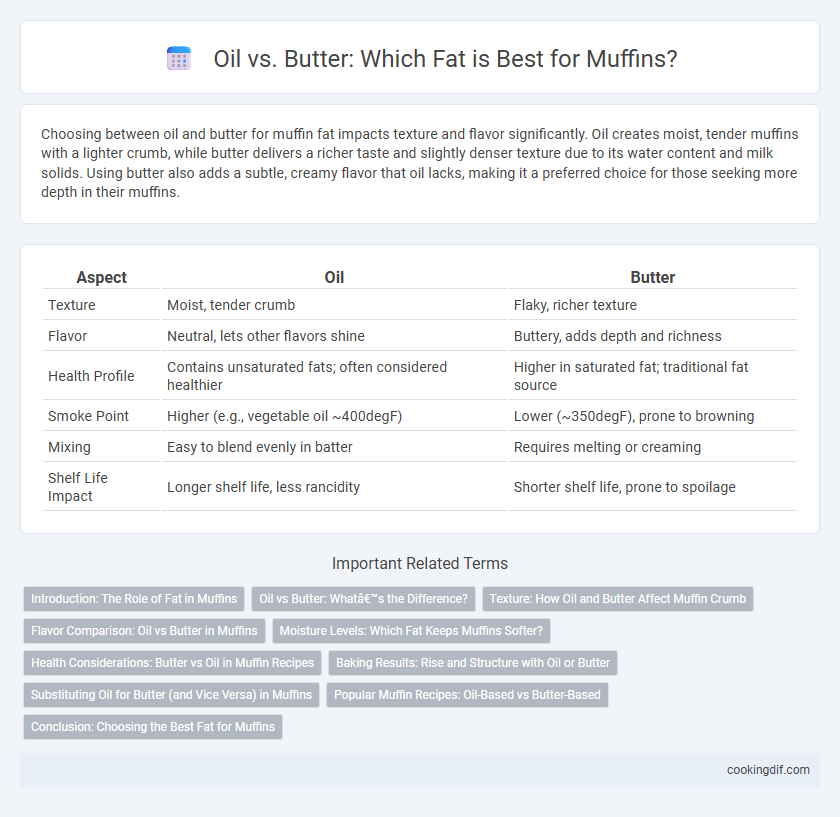Choosing between oil and butter for muffin fat impacts texture and flavor significantly. Oil creates moist, tender muffins with a lighter crumb, while butter delivers a richer taste and slightly denser texture due to its water content and milk solids. Using butter also adds a subtle, creamy flavor that oil lacks, making it a preferred choice for those seeking more depth in their muffins.
Table of Comparison
| Aspect | Oil | Butter |
|---|---|---|
| Texture | Moist, tender crumb | Flaky, richer texture |
| Flavor | Neutral, lets other flavors shine | Buttery, adds depth and richness |
| Health Profile | Contains unsaturated fats; often considered healthier | Higher in saturated fat; traditional fat source |
| Smoke Point | Higher (e.g., vegetable oil ~400degF) | Lower (~350degF), prone to browning |
| Mixing | Easy to blend evenly in batter | Requires melting or creaming |
| Shelf Life Impact | Longer shelf life, less rancidity | Shorter shelf life, prone to spoilage |
Introduction: The Role of Fat in Muffins
Fat in muffins plays a crucial role in creating a tender crumb, enhancing flavor, and contributing to moisture retention. Oil, being liquid at room temperature, produces a moist and soft texture, while butter offers rich flavor and a slightly denser crumb due to its solid state. Selecting oil or butter directly influences muffin structure, taste, and mouthfeel, impacting overall quality.
Oil vs Butter: What’s the Difference?
Oil creates moist and tender muffins due to its liquid form at room temperature, allowing for a softer crumb and longer freshness compared to butter. Butter imparts a rich flavor and denser texture, contributing to a golden crust and enhanced aroma from its milk solids. Choosing oil enhances moisture retention, while butter adds depth of taste and structure to muffins.
Texture: How Oil and Butter Affect Muffin Crumb
Oil creates muffins with a moist and tender crumb due to its liquid state, which evenly coats flour proteins and limits gluten formation. Butter contributes a richer flavor and produces a denser, slightly firmer crumb because its solid fat content creates air pockets when creamed with sugar. Choosing oil results in softer, more delicate muffins, while butter yields a textured, flavorful crumb.
Flavor Comparison: Oil vs Butter in Muffins
Butter imparts a rich, creamy flavor and a tender crumb to muffins, enhancing their overall taste with a slightly caramelized note. Oil, on the other hand, creates a moist texture but has a more neutral flavor, allowing other ingredients like fruits or spices to stand out. Choosing butter over oil results in a more decadent muffin with a pronounced buttery aroma, while oil yields a lighter, subtler taste profile.
Moisture Levels: Which Fat Keeps Muffins Softer?
Butter imparts a rich flavor to muffins but tends to produce a slightly denser texture due to its lower moisture content compared to oil. Oil, being 100% fat, contributes to higher moisture retention, resulting in softer and more tender muffins that stay moist longer. Studies in baking science reveal that oil-based muffins maintain their softness better over time, making oil the preferred choice when maximizing moisture levels is the priority.
Health Considerations: Butter vs Oil in Muffin Recipes
Choosing between butter and oil in muffin recipes impacts health due to their different fat compositions. Butter contains saturated fats and cholesterol, which may raise LDL cholesterol levels, while oil, especially vegetable or olive oil, offers unsaturated fats that support heart health. Using oil in muffins can result in lower saturated fat content and potentially better cardiovascular benefits, making it a healthier fat option compared to butter.
Baking Results: Rise and Structure with Oil or Butter
Oil yields a moister muffin with a tender crumb due to its liquid state at room temperature, promoting better rise and softer texture. Butter, solid at room temperature, provides a sturdier structure and richer flavor but can result in a denser crumb and less lift. Choosing oil enhances lightness and height, while butter favors a firmer, more flavorful muffin.
Substituting Oil for Butter (and Vice Versa) in Muffins
Substituting oil for butter in muffins creates a moister, denser texture due to oil's liquid state at room temperature, while butter imparts a richer flavor and slightly firmer crumb because of its solid fat content. When replacing butter with oil, use about 3/4 the amount of oil to maintain proper fat balance and avoid overly greasy muffins. Conversely, substituting butter for oil requires melting the butter and using a 1:1 ratio to preserve moisture and achieve a buttery taste, though the muffin's structure may become slightly less tender.
Popular Muffin Recipes: Oil-Based vs Butter-Based
Oil-based muffins often yield a moist and tender crumb, commonly preferred in popular recipes like banana or zucchini muffins for their ability to retain moisture longer. Butter-based muffins provide a richer, more flavorful profile with a slightly denser texture, ideal for classic blueberry or chocolate chip muffins where flavor depth is prioritized. Choosing between oil and butter in muffin recipes affects tenderness, flavor, and shelf life, influencing consumer preference and baking outcomes.
Conclusion: Choosing the Best Fat for Muffins
Butter imparts a rich flavor and tender crumb to muffins, making them moist and flavorful, while oil creates a softer texture and keeps muffins fresher longer due to its liquid state at room temperature. For denser, richer muffins, butter is ideal, whereas oil works best for lighter, fluffier results. Selecting the best fat depends on whether flavor intensity or texture longevity is the priority in your baking.
Oil vs Butter for muffin fat Infographic

 cookingdif.com
cookingdif.com